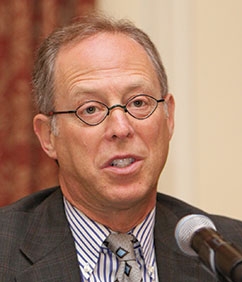Experts explore the global and domestic legal ramifications of AI
Welcoming the audience to “Artificial Intelligence: Crime, Security and International Regulation,” an all-day conference on November 9 hosted by NYU Law and the NYU Center for Cybersecurity, Professor of Practice Randal Milch ’85 likened the growing interest in regulating AI to a novelty item made popular in the 1980s.
“Remember the Chia Pet?” asked Milch, co-chair of the center. “You put water on it. You wake up the next morning, it’s all furry…. We've seen the Chia Pet of regulation of artificial intelligence happening right before our eyes.” Milch explained that the Center for Cybersecurity aimed to foster an AI discussion somewhat different from many being held elsewhere in academia by stressing the benefits of limiting regulation while also examining the potential dangers of AI that legal regimes are attempting to address.
Thomas Schneider, ambassador and director of internal relations for Switzerland’s Federal Office of Communications and chair of the Council of Europe Committee on Artificial Intelligence, delivered the day’s keynote, focused on international AI regulation. Schneider discussed some of the complexities of the committee’s work-in-progress, the Convention on Artificial Intelligence, Human Rights, Democracy and the Rule of Law. One challenge, he said, is formulating a precise definition of AI in the first place.
Schneider articulated another fundamental query: “What are the problems that we cannot solve with existing legislation or existing regulation? Are we just amending those like we had before? What is the new element that needs really fundamentally new regulation? And this is an open question.” Further, he noted that different countries have vastly different regulatory cultures and needs. As a result, he said, the new convention doesn’t aim to tell governments precisely how to govern AI.
“If voluntary commitments…are serving their purpose, then this is fine,” he said. “You just need to do whatever you can as a state to make sure that democracy, rule of law, and human rights are respected.”
Apart from the keynote address, the conference convened three expert panels:
- “AI Crimes and Crime Fighting,” moderated by Leonard Bailey, head of the Computer Crime and Intellectual Property Section of the US Department of Justice’s Cybersecurity Unit, and an adjunct professor in the Master of Science in Cybersecurity Risk and Strategy program
- “AI and National Security: New Frontiers,” moderated by Professor Samuel Rascoff, a faculty co-director at the Reiss Center on Law and Security
- “The Global Race to Regulate AI,” moderated by Adjunct Professor Judith Germano, a senior fellow at the Reiss Center on Law and Security and a distinguished fellow at the Center for Cybersecurity
Watch videos of the panels and keynote address:
Panel 1: AI Crimes and Crime Fighting
Panel 2: AI and National Security: New Frontiers
Keynote
Panel 3: The Global Race to Regulate AI
Posted December 4, 2023


